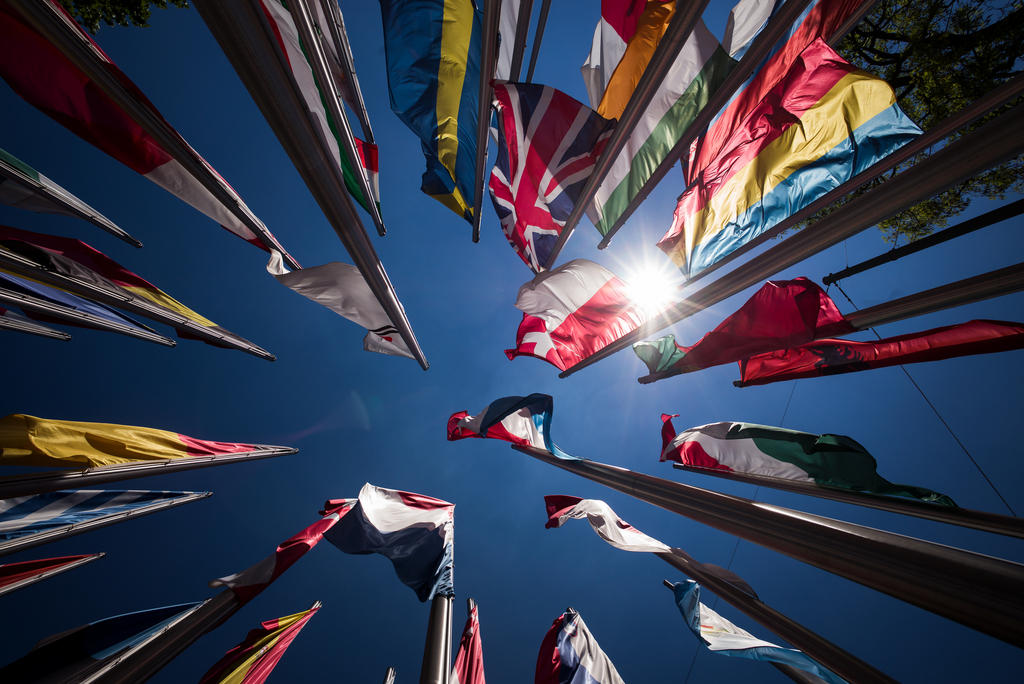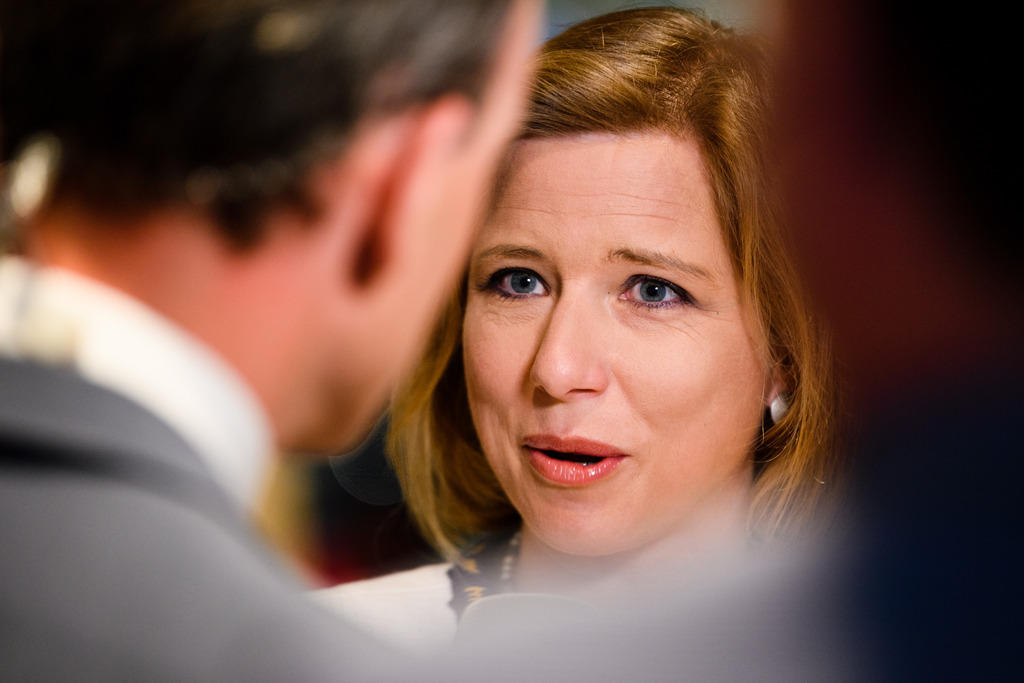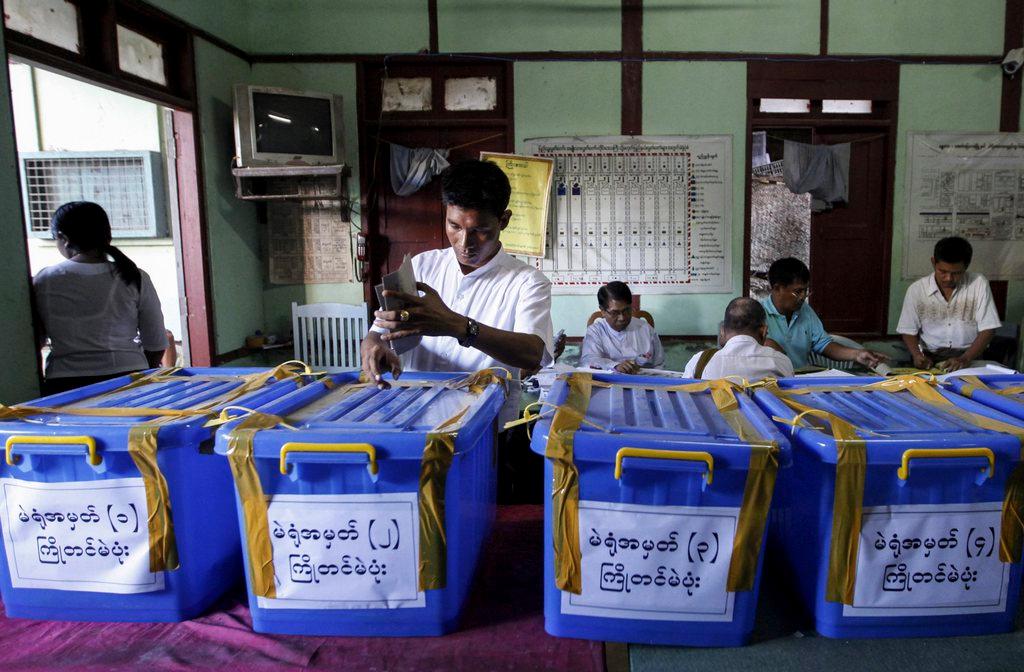
‘Neutrality no longer means passivity’

Hardly any countries are as well connected as Switzerland. That is why Christa Markwalder believes that an active foreign policy is so important. The 42-year-old politician has just taken over the presidency of the Swiss Society for Foreign Policy.
swissinfo.ch: What are the main challenges for Switzerland’s foreign policy?
Christa Markwalder: The whole world is changing. After decades of establishing democracy in the countries of the former Eastern bloc, we’re now witnessing new autocratic tendencies. Under Donald Trump, the United States is experiencing a volatile, if not chaotic, presidency. An increasing number of non-state actors are getting involved in today’s conflicts and wars, and proxy wars are being waged.
Christa Markwalder
Christa MarkwalderExternal link has represented the centre-right Radical Party in the House of Representatives since 2003.
She is a member of the Foreign Affairs CommitteeExternal link, which she presided over in 2010/2011, and advocates for bilateral relations such as with the US Congress or the British and Ukrainian parliaments.
She was president of the House of Representatives in 2015/2016 and held the presidency of the New European Movement Switzerland, which advocates for Switzerland’s membership of the EU, from 2006 to 2014.
In 2015 Markwalder was at the centre of a scandal involving Kazakhstan lobbying in the Swiss parliament.
swissinfo.ch: So Switzerland needs to find its way and place in a pretty chaotic world?
C.M.: Yes. Switzerland can play an active role by using Geneva as an international platform to bring conflict parties together. Not only do we advocate for peace, we also support economic development. Swiss companies are among the biggest direct investors abroad, which creates jobs in the respective countries. We have also achieved a lot with our dual education system, which is a sort of Swiss export commodity.
swissinfo.ch: ‘The best foreign policy is having no foreign policy at all.’ This has been the Swiss doctrine for generations.
C.M.: This has never been true and does not represent the past and present reality. Switzerland is one of the most globalised countries in the world. For this reason, it’s important that Switzerland pursues an active foreign policy.
swissinfo.ch: There is also a notion that foreign policy makers are few and far between in Switzerland.
C.M.: This could be inherent in the system. Foreign policy covers a lot of different issues, which makes it more abstract than other policy areas. A foreign policy maker is perceived to be less useful to the voters than a parliamentarian devoted to education, environmental issues or a particular transport infrastructure.
swissinfo.ch: Are the Swiss actually interested in foreign policy issues?
C.M.: Very much so, and they are very well informed. Our system of direct democracy requires voters to regularly obtain information about legislative proposals that are somewhat related to foreign policy, which they decide on at the ballot box.

swissinfo.ch: This suggests that the people have the final say when it comes to foreign policy issues in Switzerland. Could this be why the mantra of the new Foreign Minister Ignazio Cassis is ‘foreign policy is always domestic policy too’?
C.M.: Absolutely. On the one hand, domestic policy proposals are increasingly affected by foreign policy. I’m thinking of the corporate tax reform, which was rejected by voters in 2017, and the government’s tax proposal 17. It’s not simply a domestic issue. This proposal is directly linked to international and European fiscal tendencies. On the other hand, the public’s support is crucial to achieve our foreign policy goals. Only if the voters reject initiatives which isolate Switzerland regarding its foreign affairs will we be able to make successful foreign, economic and regional policies.
swissinfo.ch: But isn’t there a risk that foreign policy could simply be viewed as a branch of domestic policy?
C.M.: In our globalised world it is no longer possible to clearly separate domestic and foreign policies. Such a separation seems contrived.
swissinfo.ch: Let’s stay with globalisation. One of Switzerland’s fortes in foreign policy seems to be its international network.
C.M.: Switzerland is internationally well connected, which is reflected in our trade figures. Goods and services amounting to around CHF1 billion ($1 billion) pass through our borders every single day. Switzerland also organises the most multinational conferences per capita in the world and is active in multilateral forums. Recently, I was part of a Swiss parliamentary delegation at the UN headquarters in New York where I had the chance to talk to the Swiss representatives and discuss the issues Bern prioritises in the UN General Assembly.
swissinfo.ch: Does Switzerland have any other strengths in foreign policy?
C.M.: Another great asset is certainly its neutrality as we interpret it today. Neutrality no longer means passivity as it used to. Nowadays it is much more about playing an active role in mediation processes and peace negotiations as well as promoting and protecting human rights. Switzerland is also a well-respected protection force. This reflects the huge prestige and respect Switzerland enjoys, not least because it has never been a colonial power. It was pretty much unharmed during the world wars, it does not pursue an aggressive foreign policy and it has no hidden agenda.
swissinfo.ch: Regarding Switzerland’s relationship with the European Union, outsiders could think that the government lacks a coherent foreign policy strategy.
C.M.: When it comes to the EU, we constantly adapt our strategy to the latest developments, whereby the focus is more on what’s feasible rather than on what’s desirable. Switzerland has a constitutional basis for its foreign policy which expresses our values and solidarity with people in poor countries. Ignazio Cassis’s predecessor, Didier Burkhalter, also defined the Swiss foreign policy strategy for the period 2016-2019.
swissinfo.ch: Today is the 50th anniversary of the Swiss Society for Foreign Policy and you are taking over its presidency. How would you like to see foreign policy develop, also in your position as a parliamentarian?
C.M.: I think Switzerland should defend its values at home and abroad. It should play an active role, participate and realise its rights, opportunities and chances. Switzerland should come across as self-confident and use its Swiss charm. We have many strengths and qualities, and we should not hide them. When it comes to negotiations, we should never compromise right at the beginning of the talks. Only if it’s absolutely necessary, should we offer compromises at the end.
The Swiss Society for Foreign PolicyExternal link is celebrating its 50th anniversary. Since its formation in 1968, it has advocated for an open Switzerland.
The cross-party and non-profit organisation seeks to promote interest in Swiss foreign policy and bring it closer to the broader public. it regularly organises public briefing events on current foreign policy issues.

More
Switzerland promotes democracy where it hurts
Translated from German by Billi Bierling

In compliance with the JTI standards
More: SWI swissinfo.ch certified by the Journalism Trust Initiative





























You can find an overview of ongoing debates with our journalists here . Please join us!
If you want to start a conversation about a topic raised in this article or want to report factual errors, email us at english@swissinfo.ch.